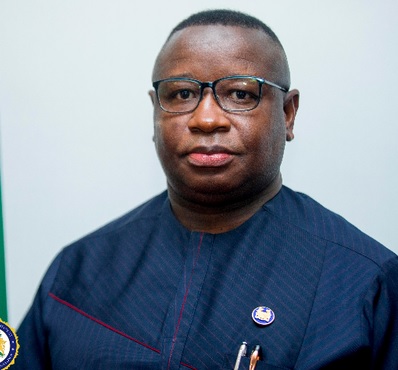President Bio has emerged stronger as he has completed his voluntary 14-day self-isolation without showing any COVID-19 sign and symptom.
Also, none of his family members showed COVID-19 sign and symptom.
The President and his family members went into self-isolation when one of the presidential guards tested positive for COVID-19.
It is a show of patriotism and statesmanship by ensuring that he isolated himself and his family members to keep his fellow compatriots safe.
He is back to steer the affairs of state in a turbulent period security threats compounded by a health disaster that is globally tragic in nature and devastating in consequence.
In the face of a looming COVID-19 threat, sad occurrences have taken place that hinges on the country’s security.
The attempted jail break at the Central Correctional Facility on Pa Demba Road in Freetown, the Lunsar and the Tombo riots are few incidents that took place when President Bio was in self-isolation.
The incidents share one thing in common, they are fatal but the attempted prison break is the most fatal.
Coming back to business, President Julius Maada Bio has taken some critical decisions that portray his commitment and uncompromising stance to the maintenance and sustenance of state security.
Currently, President Julius Maada Bio has relieved the Minister of Internal Affairs of his duties, and replaced him with the Director of the Sierra Leone Road Safety Authority, Panda Noah.
The sacking has generated intense debates and discussions within public domain.
But, gauging the speeches of the public discussants and debaters, President Julius Maada Bio is enjoying a favourable rating for the tough action to come down heavily on the Minister of Internal Affairs.
Whatever angle one comes from in assessing the status of the Internal Affairs Minister, they would arrive at the conclusion the ministry is at the fulcrum of the security of the state.
Constitutional provisions testify that the Minister of Internal Affairs is a second gentleman in the Police Council, the highest decision-making body of the Sierra Leone Police.
The council exists to provide political direction of the SLP and initiate broad policy guidelines to assist the Inspector-General in the dispensation of his duties.
Similarly, the Minster is also a member of the Defence Council, another highest body of the Republic of Sierra Leone Armed Forces.
Apart from the membership of the Minister of Internal Affairs into key security sector institutions, the Minister also supervise key security agencies including the police, Immigration Department, Prisons among others. It goes without saying that the powers bestowed on the Minister of Internal Affairs by law in terms of state security places him in a class of his own.
No question therefore exists as to whether the Minister must show leadership when the President was in self-isolation.
No gainsaying that Minister Suluku’s appointment as Minister of internal Affairs is not a question maverick on the part of President Bio, but a question of trust and confidence in the Minister that he would deliver.
However, the minister failed to live up to the expectation of President whose pleasure he sits as Minister of an enviable ministry.
Owing to his failure to deliver, Minister Suluku has become the first political casualty after the jail break, but more casualties must be brought into the list.
It has also been made clear ten senior police officers have been dismissed by Police council for failure to show leadership and to protect lives and property during the Lunsar and Tombo residents.
More officers would follow suit as investigations into the causes of the alleged riots.
Another top government official that should follow next is the Chief of Defence Staff, Lieutenant-General Brima Bureh Sesay.
Spiralling audios indicate that the CDS was at the scene of the shooting spree by trigger-happy military and police personnel.
By every indication, their presence contributed to the tragedy that unfolded at Pa Demba Road Correctional facility on the fateful day.
However, if he were not present at the scene, the CDS should be held vicariously liable for the actions of his subordinate owing to command responsibility.
Two cardinal principles underpin command responsibility in the army high command that is, failing to prevent a crime when it is about to be committed despite the foreknowledge or failing to investigate after the crime has been committed.
The first principle is that the superior military officer must be in the capacity to know about an alleged crime to be committed by his subordinates and fail to prevent it.
Secondly, the superior military officer may not have foreknowledge about the intended commission of a crime, but fail to investigate and bring perpetrators to justice after the crime has occurred.
In this case, the CDS has failed to demonstrate command responsibility in either case and must go.
The CDS security counterparts being the Inspector-General of Police, Head of office of National Security, Ag Director of prisons must succumb to the same fate.
The sackings are relevant to the current situations, but simply not enough considering the scale of lives lost across the country particularly the Pa Demba Road Killings.
President Julius Maada Bio must tread on the path of Late President Tejan Kabba by setting up a committee of top foreign and local investigators to look into the alleged killings with the aim of bringing perpetrators to justice.
When the civil war came to an end in 2001, President Tejan Kabbah of blessed memories officially requested the late UN Secretary-General to set up an international tribunal to bring to justice those who bear the greatest responsibility for the human rights violations and abuses during the war.
The late President’s move at that time was to ensure that he maintained his clean record.
Similarly, President Bio can set up a committee or tribunal to look into the riots and killings to tell the world he is clean.
Long Live President Bio


